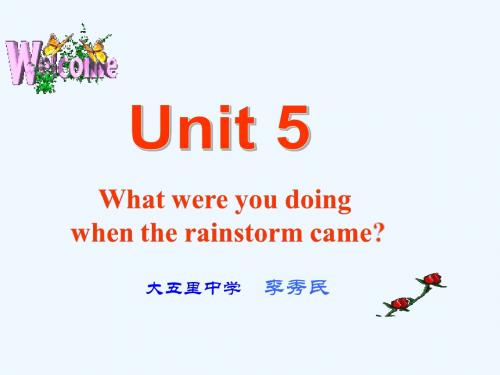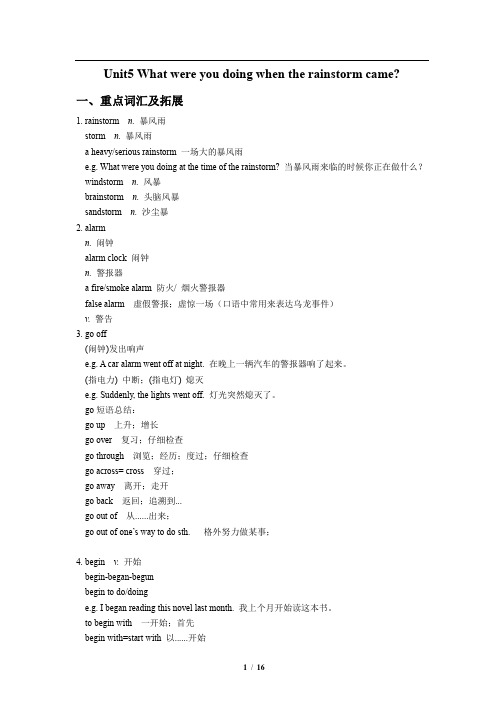人教版英语八年级下册Unit 5 What were you doing when the rainstorm came 知识点精炼讲解讲解
- 格式:doc
- 大小:48.00 KB
- 文档页数:9


Unit5 What were you doing wneh the rainstorm came?1.What were people doing yesterday at the time of the rainstorm?昨天当暴风雨来临的时候人们正在做些什么?【解析1】过去进行时⑴ .用法:①过去某个时间正在发生的动作He was cooking at six last night. 昨天晚上六点,他正在做饭。
②过去某段时间正在发生的动作I was staying here from March to May last year.去年从3月到5月,我一直呆在这里。
⑵ .与过去进行时连用的时间状语,常见的有at nine last night/ at that time= then/at thistime yesterday /或有when the teacher came in/ while he was reading的提示⑶过去进行时的构成:was\were +现在分词⑷过去进行时的四个基本句型肯定句He was cooking at six last night.否定句He was not cooking at six last night.一般疑问句Was he cooking at six last night?两回答Y es ,he was. No, he wasn’t.特殊疑问句What was he doing at six last night?⑸过去进行时的固定句型Jim was reading when the teacher came in. 当老师进来的时候,吉姆正在读书。
Jim was reading while Kate was watching TV.在凯特正在看电视的同时,吉姆正在读书。
(while可以表示过去两个动作同时进行) Jim came in while Kate was watching TV.在凯特正在看电视的时候,吉姆进来了。

八年级英语下册重点句子及短语Unit 5 What were you doing when the rainstorm came ?1.was/were doing sth 过去进行时2.at the time of the rainstorm 在暴风雨来临时3.the TV report 电视报道4.go off 发出响声/ 闹钟响6. be busy doing sth 忙于做某事be busy with sthbe free /available to do sth 有空做某事5.take a hot shower 洗热水澡6.begin to rain heavily /hard 开始下大雨7.pick up the phone = answer the phone 接电话8.strong wind 大风/ 狂风9.at that time 在那时10.bring sb closer together 使某人的关系更亲近11.with no light outside = without any light outside 外面没有灯光12. a heavy rainstorm 一场大暴风雨13.in this area 在这个地区14.some pieces of wood 一些木头15.make sure of sth / make sure that 确信/ 务必16.beat heavily against the windows 猛烈的敲打窗户17.play a card game 玩纸牌游戏18.fall asleep 入睡19.fallen trees 倒塌的的树木20.die down (dying) 逐渐减弱21.broken windows 破损的窗户22.break many things apart 摧毁许多东西23.find the neighborhood in a mess 发现附近地区一片狼藉24.right away /at once /right now 立刻,马上25.get to the place of the accident 到达事故现场26.because of the heavy snow from the night before由于头天夜里的大雪27.be in bad shape 情况很糟糕,变形28.You’ re kidding ! 你在开玩笑把!29. a school basketball competition 学校篮球赛30.by the side of the road 在路边31.wait for sb to walk by 期待/ 等待有人路过32.make one’s way to +地点费力的往某地赶…33.important event 重要的事件34.be killed 被杀害35.on the radio 通过收音机36.tell the truth 说出真相37.in silence 沉默,无声be/ keep silent 保持沉默38.sb be completely shocked 某人被完全震惊了39.be taken down by terrorists 被恐怖分子摧毁40.have meaning to most Americans 对大多数美国人有意义41.remember doing sth 记着做了某事remember to do sth 记着做某事(还未做)42.look out of the window 往窗外看重点句:1 .- What were you doing at eight last night ? 昨天晚上八点你在做什么?- I was taking a shower . 我正在洗澡。


Unit5 What were you doing when the rainstorm came?一、重点词汇及拓展1. rainstorm n.暴风雨storm n.暴风雨a heavy/serious rainstorm 一场大的暴风雨e.g. What were you doing at the time of the rainstorm? 当暴风雨来临的时候你正在做什么?windstorm n.风暴brainstorm n.头脑风暴sandstorm n.沙尘暴2. alarmn. 闹钟alarm clock 闹钟n. 警报器a fire/smoke alarm 防火/ 烟火警报器false alarm 虚假警报;虚惊一场(口语中常用来表达乌龙事件)v.警告3. go off(闹钟)发出响声e.g. A car alarm went off at night. 在晚上一辆汽车的警报器响了起来。
(指电力) 中断;(指电灯) 熄灭e.g. Suddenly, the lights went off. 灯光突然熄灭了。
go短语总结:go up 上升;增长go over 复习;仔细检查go through 浏览;经历;度过;仔细检查go across= cross 穿过;go away 离开;走开go back 返回;追溯到...go out of 从......出来;go out of one’s way to do sth. 格外努力做某事;4. begin v.开始begin-began-begunbegin to do/doinge.g. I began reading this novel last month. 我上个月开始读这本书。
to begin with 一开始;首先begin with=start with 以......开始近义词:start v.开始;发动(汽车引擎)start to do/doingbeginning n. 开始at the beginning of 在……开始的时候近义词:start n.开始5. heavily adv.在很大程度上;大量地e.g. It is raining heavily. 雨下得很大。

2019-2020学年人教版英语八年级下册Unit 5 What were you doing when the rainstorm came?知识点精炼讲解讲解知识点1:重点词组与语法讲解1【考查点】重点词组1. make sure 确信;确认2. beat against... 拍打……3. fall asleep 进人梦乡;睡着4. die down 逐渐变弱;逐渐消失5. wake up 醒来6. in a mess 一团糟7. break.. . apart 使……分离8. in times of difficulty 在困难的时候9. at the time of 当.......时候10. go off (闹钟)发出响声11. take a hot shower 洗热水澡12. miss the bus 错过公交车13. pick up 接电话14. bring... together 使……靠拢15. in the area 在这个地区16. miss the event 错过这个事件17. by the side of the road 在路边18. the Animal Helpline 动物保护热线19. walk by 走路经过20. make one’s way to.在某人去……的路上21. hear the news 听到这个消息22. important events in history 历史上的重大事件23. for example 例如24. be killed 被杀害25.over 50 5 0多(岁)26. a school pupil 一个小学生27. on the radio 通过广播28. in silence 沉默;无声29. more recently 最近地;新近30.the World Trade Center 世贸中心31.take down 拆除;摧毁32.have meaning to 对……有意义33.remember doing sth. 记得做过某事34. at first 首先;最初【考查点】重点句型与语法要点:知识点1alarm n 闹钟an alarm clock 一个闹钟【解析】go off 发出响声, (闹钟)闹响,离开The alarm went off just now. 刚才警钟响了【短语】 go over 复习 go away 离开go by (时间)过去go for a walk 出去散步go fishing/shopping/skating/swimming 去钓鱼/去买东西/去溜冰/去游泳知识点2strange adj. 奇怪的→strangely adv奇怪地→stranger n 陌生人be strange to 对……感到陌生strange 奇怪的It’s strange that she came to the party. 陌生的 He stands in a stranger street.知识点3With no light outside, it felt like midnight.此句中介词with表示一种伴随状况,同时还包含着某种因果关系,表示“因某种状况的存在而导致……”, 因此可翻译成“由于;因为”等。
e.g. With my parents away, I’m the king of the house. 我爸妈不在家,我可是家中的“王”了!I can’t work with all that noise going on. 由于那噪音响着,我无法工作。
4.【解析】feel like doing sth = would like/want to do sth想要做某事知识点4 begin 开始例:I’ll begin whenever you’re ready.常用短语:⑴begin to do与begin doing一般来说,begin to do和begin doing可以互换,但在以下三种情况下,用to do。
⑵at the beginning of 在……的开始知识点5make sure“确认,查明,核实;确保;设法保证”,其后可接句子,或接介词 of 及宾语,用来引入需要确认的内容。
e.g. Could you make sure what time he’s arriving? 你能确认一下他几点到达吗?Make sure you turn off the TV before you leave the house. 在你离开屋子前确认关闭了电视。
知识点6:pick up⑴pick up=pick up the phone接电话⑵捡起;抱起例:The children picked up many sea shells at the seashore.⑶搭载例:The car stopped to pick me up. 汽车停下来接我。
知识点7:light⑴作不可数名词,意为“光,光线,光亮”例:The sun gives out light and heat.⑵作可数名词,意为“灯,光源”例:Don’t cross the road when the traffic lights are red.⑶作形容词,意为“轻的,浅色的”例:Is the box heavy or light?例:I like the light green dress.⑷作档次,意为“点燃”;过去式为lit/ lighted例:He sat down and lit a cigarette.知识点8:beat⑴作不及物动词,意为“敲打,(风雨)冲击;(心脏、脉搏)等跳动”例:The rain is beating heavily against the window.例:His heart stopped beating.⑵作及物动词,意为“打,敲打”例:Who is beating the drum?⑶作及物动词,意为“打败”,后接某人。
例:We beat them by 3:2.知识点9:against⑴作介词,意为“倚,靠,撞”例:Put the piano there ,with its back against the wall.例:He was throwing a ball against the wall.⑵作介词,意为“反对,违反”例:That is against the law.fight against 为了反对……而战知识点10:asleepasleep 形容词,意为“睡着”,常作表语,短语固定搭配为:fall asleep例:She cleaned the room while her baby was asleep.【辨析】asleep、sleepy、sleeping⑴asleep 表示“睡着”,常作表语。
例:He is asleep on the sofa.⑵sleepy 表示“要睡的,困倦的”,可作表语和定语例:I feel sleepy. I’m going to bed.⑶sleeping 表示“睡着的,正在睡觉的”;作定语;还可表示与睡有关的东西,如sleeping bag,sleeping pill。
例:A young woman with a sleeping bay in her arms got on the bus.知识点11 die down 逐渐变弱;逐渐消失【拓展】die down与die out的用法区别:die down: 反映风、声音、愤怒、掌声、战斗等平息下来。
die out: 指家庭、种族、物种、组织、信仰等的消失或消亡。
This kind of bird has died out in the world.这种鸟已经在世界上灭绝了知识点12:rise 上升【辨析】rise、raise⑴rise是不及物动词,意为“(价格、水位等)上涨;(月亮、太阳等)上升”,主语常为物。
例:The moon was rising when I went home.⑵raise 及物动词,意为“上升,提高,筹集,养育等”,主语常为人。
例:The girl raised the box to the truck.知识点13: silencesilence 不可数名词,意为“沉默,无声”,常用短语为in silence.例:She is eating dinner in silence.例:There was nothing but silence in the room.silent 形容词,意为“无声的,寂静的”例:He kept silent when he heard the news.知识点14happen 发生;碰巧(指偶然性发生)(1) happen v “发生”没有被动语态,主语是物,强调某事发生的偶然性a. sth. happen to sb. 某事发生在某人身上What happened to you?=What was wrong with him?b. sb. happen to do sth. 某人碰巧做某事(2)take place 发生,指事情有计划有安排地发生The sports meeting took place in our school last week.(3) It happened that…碰巧知识点15: truthtruth 作不可数名词,意为“真相,事实,实情”,常用短语为to tell you the truth (说实话)。
例:The boy never tells the truth.true 作形容词,意为“真实的,真正的”。
例:It is true that he succeeded.truly 作副词,意为“真正地,真地”。
例:He seems to truly believe that.知识点16hear的用法hear意为“听见”,强调听的结果。
【结构】:hear sb. do sth听见某人做某事;hear sb. doing sth听见某人正在做某事hear也有“听说”之意,这时后接that引导的宾语从句。
① hear about意为“听说”,相当于hear of,后面接词或短语。
I have heard about/of the story before. 我以前就听说过这个故事。
② hear from意为“收到.......的来信;有.......的消息”,=get/receive a letter from.知识点17 trouble n 困难;苦恼;忧虑⑴ in trouble 处于困境中 get sb. into trouble 使某人陷入困境⑵ What's the trouble with you? = What’s the matter with you?= Wha’t wrong with you? 你怎么啦?⑶ have trouble (in)doing sth 做某事有麻烦◆ have problem /difficulty/fun (in) doing sth 做某事有问题/困难/乐趣知识点18: as wellas well 相当于一个副词,意为“也,还”;只用于否定句或肯定句中,常放在句末,不用逗号隔开。